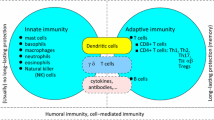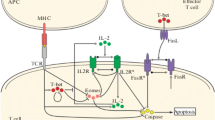Abstract
In the course of the paper we recall the Markov model for immunological Evolutionary Multi-Agent System. The model allows to study dynamic features of the computation and increases understanding the considered classes of systems. The main contribution of the paper is the draft of the proof of the ergodicity feature of the Markov chain modelling iEMAS dynamics.
Access this chapter
Tax calculation will be finalised at checkout
Purchases are for personal use only
Preview
Unable to display preview. Download preview PDF.
Similar content being viewed by others
References
Billingsley, P.: Probability and Measure. Wiley-Interscience (1995)
Byrski, A., Kisiel-Dorohinicki, M.: Immunological selection mechanism in agent-based evolutionary computation. In: Proc. of IIS: IIPWM 2005 Conference, Gdansk, Poland. Advances in Soft Computing. Springer (2005)
Byrski, A., Kisiel-Dorohinicki, M.: Agent-based evolutionary and immunological optimization. In: Shi, Y., van Albada, G.D., Dongarra, J., Sloot, P.M.A. (eds.) ICCS 2007, Part II. LNCS, vol. 4488, pp. 928–935. Springer, Heidelberg (2007)
Byrski, A., Kisiel-Dorohinicki, M., Nawarecki, E.: Agent-Based Evolution of Neural Network Architecture. In: Hamza, M. (ed.) Proc. of the IASTED Int. Symp.: Applied Informatics, IASTED/ACTA Press (2002)
Byrski, A., Schaefer, R.: Stochastic model of evolutionary and immunological multi-agent systems: Mutually exclusive actions. Fundamenta Informaticae 95(2-3), 263–285 (2009)
Byrski, A., Schaefer, R., Smołka, M.: Asymptotic features of parallel agent-based immunological system. In: Burczyński, T., Kołodziej, J., Byrski, A., Carvalho, M. (eds.) Proc. of 25th European Conference on Modelling and Simulation (2011)
Cetnarowicz, K., Kisiel-Dorohinicki, M., Nawarecki, E.: The application of evolution process in multi-agent world (MAW) to the prediction system. In: Tokoro, M. (ed.) Proc. of the 2nd Int. Conf. on Multi-Agent Systems (ICMAS 1996). AAAI Press (1996)
Dasgupta, D., Nino, L.: Immunological Computation Theory and Applications. Auerbach (2008)
Davis, T.E., Principe, J.C.: A simulated annealing like convergence theory for the simple genetic algorithm. In: Proc. of the Fourth International Conference on Genetic Algorithms, San Diego, CA, pp. 174–181 (1991)
Goldberg, D., Segrest, P.: Finite Markov chain analysis of genetic algorithms. In: Proceedings of the Second International Conference on Genetic Algorithms on Genetic Algorithms and their Application, pp. 1–8. L. Erlbaum Associates Inc., Hillsdale (1987)
Horn, J.: Finite Markov Chain Analysis of Genetic Algorithms with Niching. In: Proceedings of the Fifth International Conference on Genetic Algorithms, pp. 110–117. Morgan Kaufmann (1993)
Horst, R., Pardalos, P.: Handbook of Global Optimization. Kluwer (1995)
Iosifescu, M.: Finite Markov Processes and Their Applications. John Wiley and Sons (1980)
Mahfoud, S.: Finite Markov Chain Models of an Alternative Selection Strategy for the Genetic Algorithm. Complex Systems 7, 155–170 (1991)
Rinnoy Kan, A., Timmer, G.: Stochastic global optimization methods. Mathematical Programming 39, 27–56 (1987)
Rudolph, G.: Massively parallel simulated annealing and its relation to evolutionary algorithms. Evolutionary Computation 1, 361–383 (1994)
Schaefer, R., Byrski, A., Smołka, M.: Stochastic model of evolutionary and immunological multi-agent systems: Parallel execution of local actions. Fundamenta Informaticae 95(2-3), 325–348 (2009)
Schaefer, R.: Foundations of global genetic optimization. Springer (2007)
Suzuki, J.: A Markov Chain Analysis on a Genetic Algorithm. In: Forrest, S. (ed.) Proc. of the 5th ICGA, pp. 146–154. Morgan Kaufmann (1993)
Vose, M.: The Simple Genetic Algorithm: Foundations and Theory. MIT Press, Cambridge (1998)
Wierzchoń, S.: Function optimization by the immune metaphor. Task Quaterly 6(3), 1–16 (2002)
Wolpert, D.H., Macready, W.G.: No free lunch theorems for optimization. IEEE Transactions on Evolutionary Computation 1(1), 67–82 (1997)
Author information
Authors and Affiliations
Editor information
Editors and Affiliations
Rights and permissions
Copyright information
© 2013 Springer-Verlag Berlin Heidelberg
About this chapter
Cite this chapter
Byrski, A., Schaefer, R., Smołka, M. (2013). Markov Chain Based Analysis of Agent-Based Immunological System. In: Nguyen, NT., Kołodziej, J., Burczyński, T., Biba, M. (eds) Transactions on Computational Collective Intelligence X. Lecture Notes in Computer Science, vol 7776. Springer, Berlin, Heidelberg. https://doi.org/10.1007/978-3-642-38496-7_1
Download citation
DOI: https://doi.org/10.1007/978-3-642-38496-7_1
Publisher Name: Springer, Berlin, Heidelberg
Print ISBN: 978-3-642-38495-0
Online ISBN: 978-3-642-38496-7
eBook Packages: Computer ScienceComputer Science (R0)




